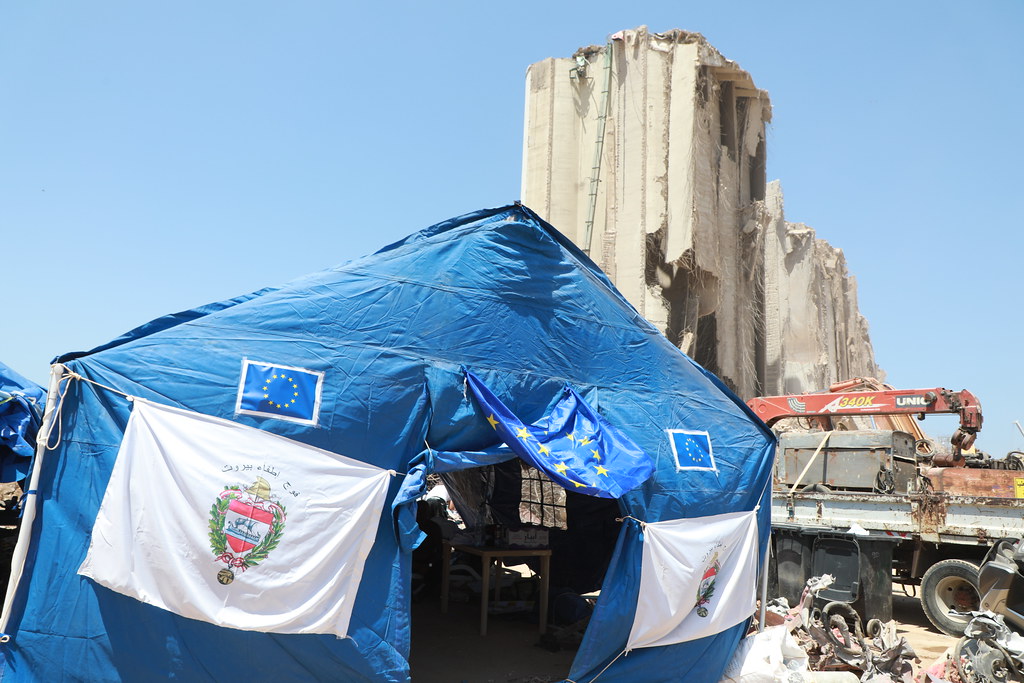
Efforts by civil society may sow the seeds for the desired state building that would preferably be developed inclusively from the bottom up by the Lebanese people as the country seeks to extricate itself from its current troubles.
In the first weeks following the explosion at the Beirut Port on August 4, 2020, discussion about the role of Lebanon’s civil society shifted from the protests and mobilizations of downtown Beirut to the efforts deployed to support the recovery of the devastated neighborhoods. The inspiring energy of hundreds of young individuals who flocked to the downtown districts affected by the blast, armed only with shovels and brooms, fueled hope in a city where time seemed to have stood still. The youth appeared to embody the hope of a people devastated by three decades of post-civil war governments that entrenched corruption and sectarianism in every element of the Lebanese state.
As the weeks pass, however, progress on recovery seems slow. Indeed, while vibrant efforts and remarkable initiatives are set in place, weak coordination and lack of funding amid one of the worst financial crises in decades usher in a difficult winter for those who dreamed of quickly returning to their houses. This also revives echoes of earlier missed opportunities to rebuild inclusively and fairly.
Using the lens of the post-blast recovery as an entry point to explore the current conditions of Lebanon’s mobilized civil society, we argue in this policy paper that although the situation testifies to the dynamism of a society keen to recover, the delegation of the recovery to activist movements, nongovernmental organizations (NGOs), and international nongovernmental organizations (INGOs) within a discourse of sidelining the state should be cause for alarm. To be sure, experiences in post-disaster recovery indicate that a critical ingredient for the successful interventions of civil society groups and nongovernmental organizations is the synergy that is set between them and public agencies. While state agencies cannot reach communities with the same effectiveness, their typically assigned roles as custodians of the common good and as coordinators remain critical. In Lebanon, the rampant corruption and accumulated failures of state agencies have encouraged an adversarial position among activist groups who demand the exclusion of the state from the reconstruction.
Understanding the Context: The Anti-State Rhetoric
Almost a year after the outbreak of the October 2019 uprising in Beirut, and amid a devastating financial meltdown generated by the deep corruption of Lebanon’s ruling elite, the port explosion came to consecrate what many described as a war waged against Lebanese citizens by the country’s political class. Anger mounted, and even those who cling to the traditional political class for protection because they fear their position as minorities in a volatile regional context can hardly ignore the responsibility of a governance body that knowingly tolerated the callous storage of explosive material in close proximity to people’s homes.
“Since rampant corruption has been widely exposed and associated with the financial collapse, it is inconceivable, the argument goes, to trust state agencies with the funds earmarked for the reconstruction of the devastated districts.”
In this context, the ubiquitous rhetoric among mobilized activists, organized groups, and political initiatives is to exclude the corrupt Lebanese political class and all its appointees in public agencies from the reconstruction process. This position was rapidly echoed by the international community as well as by many donors and INGOs who discussed the deficit of trust and the possibility of bypassing public agencies in recovery work.
Written by Mona Fawaz and Mona Harb
Image: flickr/BERNARD KHALIL
Publication date: October 13, 2020
Trusted Guide: Where to donate?
EXTERNAL LINK
arab.org is not responsible for the content of external websites.
Giving Tuesday Lebanon



Copyright © 2024 The Olive Tree SAL, all rights reserved. Terms of Use | Privacy Policy